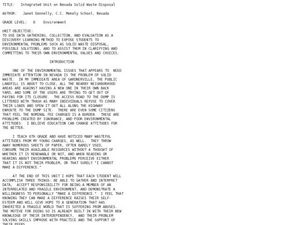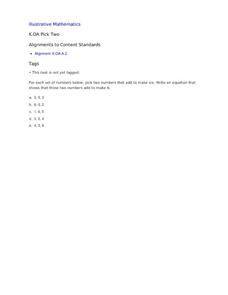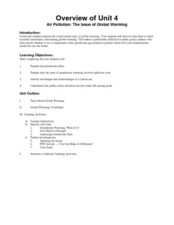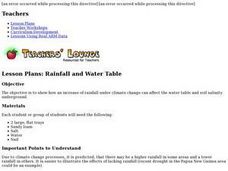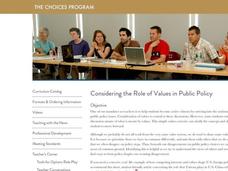Crafting Freedom
Harriet Jabocs and Elizabeth Keckly: The Material and Emotional Realities of Childhood in Slavery
Through the journals written by Harriet Jacobs and Elizabeth Keckly, young readers gain insight into the lives of two enslaved children on nineteenth-century plantations.
Curated OER
Integrated Unit on Nevada Solid Waste Disposal
Sixth graders examine how to gather and interpret data, accept responsibility for the environment, and demonstrate an interest in making a difference in this series of lessons.
PBS
Stories of Painkiller Addiction: Decisions and Consequences
Teach young learners that most drug addictions end in one of three outcomes: treatment, jail, or death. After watching a short video segment on the consequences of drug abuse, class members discuss what they viewed and consider what...
Curated OER
Tropical Travel choices
Students recognize the difference between needs and wants. In this tropical travel lesson, students observe a coin from the Northern Mariana Islands and plan a trip. Students read text about the island and complete a "weigh your...
Willow Tree
Problem Solving
School subjects connect when your young scholars use math to edit English. Math allows you to convert an entire paragraph into a simple equation or inequality. Examples encourage learners to write expressions, equations, and inequalities...
Illustrative Mathematics
Pick Two
Learning to break apart numbers into smaller pairs is a critical step young mathematicians take as they develop their number sense. To practice this skill, children are provided with sets of three numbers and are asked to pick the two...
Illustrative Mathematics
Many Ways to Do Addition
A great aspect of teaching math is that children have the freedom to solve problems using a variety of different strategies. The focus of this lesson is for young mathematicians to become aware of many ways of answering addition...
Chicago Botanic Garden
Weather or Not
What is the difference between weather and climate? This is the focus question of a lesson that takes a deeper look at how weather data helps determine climate in a region. Using weather and climate cards, students decide if a statement...
Media Smarts
Advertising All Around Us
Here is a set of advertising lessons, explore language, techniques, representation, and target audiences. Discuss the impact ads have on our daily lives. What do we see and how do they make us feel? Observe ads from around the world and...
EngageNY
Percent Rate of Change
If mathematicians know the secret to compound interest, why aren't more of them rich? Young mathematicians explore compound interest with exponential functions in the twenty-seventh installment of a 35-part module. They calculate future...
Curated OER
Domain: Operations and Algebraic Thinking
Practice basic operations for young mathematicians in fun ways! Using two decks of cards (Ace through 10 plus the joker), learners play "memory" by matching numbers that can be added to make 10 and writing number sentences. In another...
Curated OER
Reading Bugs
Review the phonemic sounds of the alphabet letters before examining how to blend letter sounds to make a word. During this teacher-modeled lesson, learners make word bugs out of three phonemes that blend together. As an assessment, read...
Michigan State University
Gases Matter
Young scientists learn that seeing isn't necessarily believing when it comes to the states of matter. After performing a fun class demonstration that models the difference between solids, liquids, and gases, children complete a series of...
K20 Learn
Bavaria Has Issues...Experimental Components
New ReviewDo you want to be a detective by analyzing situations? An engaging lesson provides young historians with the tools to help them understand the difference between data types and how to analyze them to draw conclusions. Scholars complete...
Curated OER
Easier Way to Subtract
In this subtraction review worksheet, students read about the Tic Tac Toe method for subtraction and then use the method to solve some problems.
Curated OER
Air Pollution: The Issue of Global Warming
Here is an outstanding 10-page lesson plan on global warming. Learners discover that there is a lot of controversy surrounding this topic in that the science behind global warming is difficult to prove. The best thing about this plan is...
Curated OER
Rainfall and Water Table
Through inquiry, experimentation, and observation, young scientists see how an increase in rainfall under climate change can affect the water table and soil salinity underground. Young scientists build models that represent the...
Curated OER
Comparing the Food Choices and Body Image of 15-Year-Olds Around the World
Students interpret data regarding food choices and the perceived body image of youth in the world. In this personal health lesson, students compare food consumption patterns in Canada with other countries. Students also compare lifestyle...
Brown University
Considering the Role of Values in Public Policy
Strong opinions come from deeply held values. Young citizens explore the values that are most important to them in a class discussion and activity. As they prioritize a list of values cards that include freedom, justice, and democracy,...
Curated OER
Teaching the Yoshimi Sode-Dako (Sleeve Kite)
Students explore Japanese culture through the art of kite-making. They read several selections on the importance of kites in Japanese to a Japanese holiday and the physics behind flying a kite. Then they work in amall groups to build and...
Montana State University
What's the Weather?
How many jackets do you need to stay warm and climb Mount Everest? An informatie resource covers the topic of Mount Everest, the resource helps young scientists discover the difference between climate and weather. Activities include...
Curated OER
Tutti Frutti
Get some competition going in your life science class. Give lab groups a variety of plant parts, all of them fruits, except one. Their mission is to make observations, compare and contrast, in order to be the first to identify the...
Safe Drinking Water Foundation
Ask an Engineer
A wrap-up to the unit, young environmentalists discuss and write about the difference in perspectives of a water keeper and water treatment engineer.
Science 4 Inquiry
Temperature of Inner Planets
Mars, Earth, and Venus contain atmospheres that generate weather. Young scientists explore the temperature of inner planets. They create a model simulating the greenhouse effect before researching and answering guided questions to...



